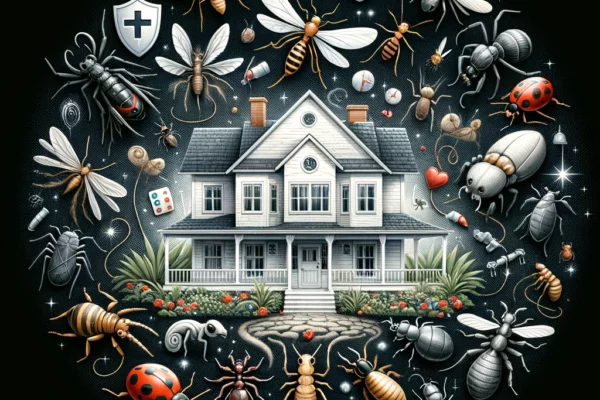Little creatures do lots of damage. It’s easy to underestimate pests’ effects on our health. They disrupt the tranquility of our homes, trigger allergies, contaminate food supplies, and cause psychological distress. Oftentimes, they compromise the mental peace and physical health of our family members.
The fear and anxiety pests induce shouldn’t be overlooked. Living with pests is a stressful experience. Thoughts of unexpectedly encountering unwanted creatures creates a constant sense of unease and affects one’s mental well-being. Pests like bed bugs or rodents may degrade sleep with insomnia and restlessness.
As a family-owned business, we understand the importance of your family’s health and wellbeing. While you may diligently clean and maintain your living space, unseen invaders can pose significant health risks. Janssen Pest Solutions understands these concerns, and we’re committed to safeguarding your home from these hidden hazards.
What are the health concerns of household pests?
When pests enter our homes, they bring health hazards with them. Some common issues include respiratory distress, food contamination, and mental discomfort. When these problems arise, you’re never alone.
Our experts are equipped to identify, manage, and prevent infestations. Exterminators have specialized training in treating infestations. Their experience allows them to efficiently assess the situation, determine the most effective treatment methods, and implement long-term pest management solutions. Our comprehensive approach ensures your well-being and comfort.
What are Iowa’s household pests?
Iowa is home to several common household pests, including:
Mosquitoes: These pests are prevalent during the warmer months. They may be lured inside by stagnant water sources, like vases and pet water bowls.
Ants: Iowa has a variety of ant species. These creatures are a common nuisance to homeowners and often invade homes in search of food and water.
Spiders: Most Iowan spider bites are harmless, but that doesn’t mean they make good roommates! Many people find their presence unsettling.
Rodents: Mice and rats are known for seeking shelter in homes, especially during colder months. They spread diseases through their droppings and urine.
Cockroaches: These resilient pests trigger allergies in some individuals. They’re attracted to moist, humid environments, including leaky pipes and condensation.
Termites: Termites feed on cellulose, a component found in wood and plant materials They’re a destructive pest that can cause significant damage to wooden structures if left unchecked.
Bed Bugs: Bed bugs quickly infest homes and cause itchy bites, leading to discomfort and sleep disturbances. Always check for bed bug activity when introducing secondhand fabrics and furniture into your home.
Can pests cause respiratory distress in humans?
Certain pests can trigger respiratory distress in humans, especially in people with pre-existing conditions. Pests like cockroaches, rodents, and dust mites are notorious for triggering allergies and respiratory issues. Their presence is especially linked to worsening asthma symptoms. They contaminate the air with shed skin and droppings, leading to coughing, wheezing, chest tightness, and asthma attacks.
Can pests transmit diseases to humans?
Yes, pests can transmit disease to humans. Common pests like mosquitoes, ticks, and rodents are known carriers of diseases. Mice and rats are common disease-bearing household pests. It’s crucial to address pest infestations quickly to minimize health risks.
Can pests contaminate food?
Pests are constantly attracted to food sources. They’re adept at finding their way into our pantries and kitchens, leading to contamination and health risks. From beetles to rodents, these unwelcome visitors compromise the safety of what we eat.
Rodents are some of the biggest culprits. Rats and mice are major disease carriers and contaminate food with urine, feces, and hair. They gnaw through food packaging and leave it vulnerable to contamination. Their droppings spread harmful bacteria that create serious health issues if ingested.
How do pests affect mental health?
The emotional impact of pest problems is tiresome, and living with pests takes a toll on mental health. Worrying and stressing over pests heightens anxiety and decreases peace of mind. They disrupt a home’s security and leave homeowners feeling a lack of control.
A professional can re-establish your sense of security. Exterminators address tangible issues while alleviating the emotional burden of pest-infested environments.
What are some warning signs and strategies for a pest-free home?
Preventive measures are the best way to keep your home pest-free. Conduct regular inspections and pay special attention inside cabinets, under sinks, in basements, and in attics.
Additionally, inspect your home for cracks and gaps. If you find any openings, seal them using caulk or other sealants.
How do I keep pests from affecting my family’s health?
Implementing prevention-focused pest control solutions is the best way to keep these critters from affecting your family’s health. Creating an inhospitable environment using comprehensive techniques helps safeguard your family’s health and well-being.
Ready to talk to an expert? Contact us today. At Janssen Pest Solutions, we tackle pest problems with empathy and efficiency. Our pest technicians ensure thorough, long-lasting solutions. We’re dedicated to transparent communication, education, and ongoing support to help you make informed decisions regarding pest control solutions.

